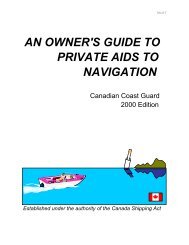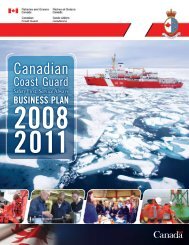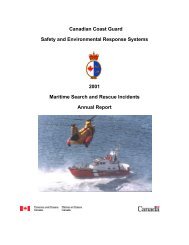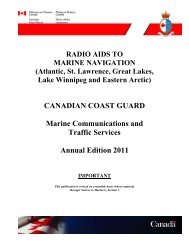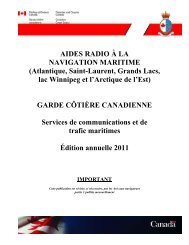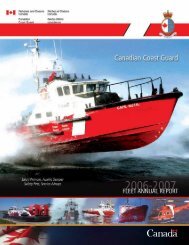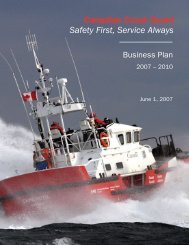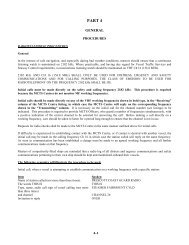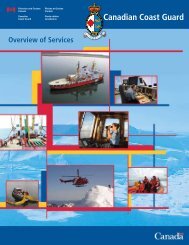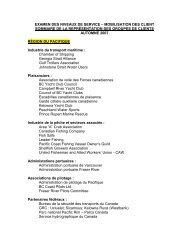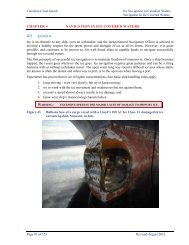Business Plan - Canadian Coast Guard
Business Plan - Canadian Coast Guard
Business Plan - Canadian Coast Guard
Create successful ePaper yourself
Turn your PDF publications into a flip-book with our unique Google optimized e-Paper software.
Section 4: What We Do Every DayMarine Communicationsand Traffic ServicesSafety of mariners and environmental protectionin <strong>Canadian</strong> waters is highly dependent on theefficient and timely communication of information.With centres located across Canada, the MarineCommunications and Traffic Services (MCTS)program is CCG’s communication backbone. Byensuring that an efficient communication system isavailable on a 24/7 basis, the program contributes tothe safety of life at sea, the protection of the marineenvironment, the efficient movement of shipping inwaterways, and the provision of essential and accurateinformation to mariners. Its services are essential todeploying Search and Rescue and EnvironmentalResponse teams promptly and effectively to maritimecrisis situations. MCTS is, in many situations, the onlymeans by which a ship’s call for assistance can be heard.Pacific5 MCTS Centres44 remote sitesCentral and Arctic5 MCTS Centres49 remote sitesQuébec4 MCTS Centres34 remote sitesCanada22 MCTS Centres202 remote sitesNewfoundlandand Labrador5 MCTS Centres42 remote sites332008-2009 AccomplishmentsMarine Communications and Traffic Services• Finalized planning for the navigational warning systemin the Arctic.• Fulfilled the requirements of the new Canada Shipping Act,2001. by implementing new procedures.• Conducted two national recruitment campaigns, resultingin 30 new recruits to the CCG College.What we do…• Manage ship traffic movements and radio contacts,delivering navigational information and assistanceto vessels and ensuring a safe and orderly flow ofmarine traffic;• Provide distress and safety communications andcoordination to detect distress situations, ensuretimely assistance, and save lives;• Provide vessel screening to prevent the entry ofunsafe vessels into <strong>Canadian</strong> waters; and• Manage an integrated marine information systemthat initiates the emergency response network andsupports other government departments.The Marine Communications and Traffic Servicesprogram is delivered with the support of…• CCG Integrated Technical Services (ITS). Given thereliance on technology for delivery of the program,MCTS receives critical engineering and technicalsupport from ITS.• Environment Canada (EC) and Transport Canada(TC), through Memoranda of Understanding. ECsupplies essential marine weather and ice information,and TC provides the regulatory regime for VesselTraffic Services (VTS) and ship radio requirements.• The United States <strong>Coast</strong> <strong>Guard</strong>, via a treaty, for vesseltraffic management in the Juan de Fuca Strait.Looking Forward…The MCTS program is highly dependent on newtechnology driven by international fora such asthe International Maritime Organization and theInternational Telecommunication Union; on changesin the marine transportation industry, which hasseen the introduction of ever bigger and fastervessels; and on heightened security concerns. Ofparticular importance for the MCTS program isthe implementation of e-Navigation. The advent ofe-Navigation is expected to offer opportunities forincreased efficiencies for the MCTS program andthe potential for reviewing VTS Levels of Service.Maritimes3 MCTS Centres33 remote sitesBUSINESS PLAN 2009-2012



